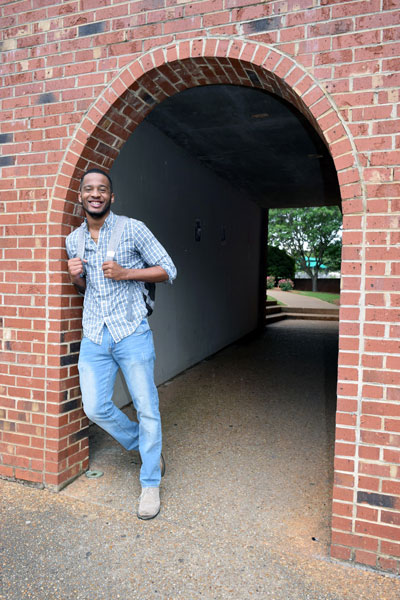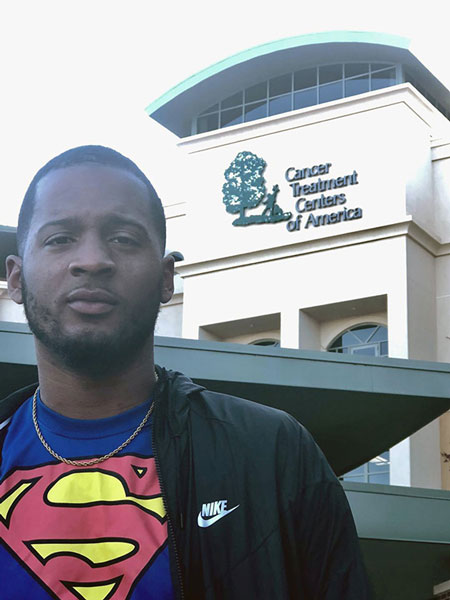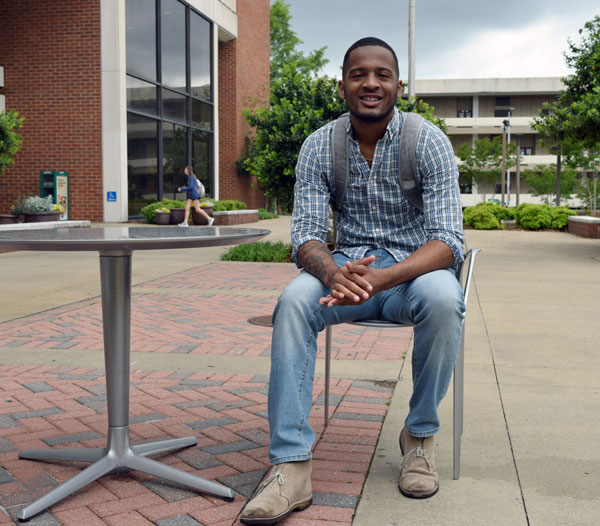The word “survivor” means many things to many people, but for 24-year-old Rashad Hayes it’s one more opportunity to make a difference in someone else’s life.
Whether it’s sharing the story of his poverty-stricken childhood or his experience with homelessness or his battle with cancer while in college, the Enterprise, Alabama, native knows what it means to be a survivor.
“I know what I went through in my life and I don’t want anyone else to experience anything like that, but in case they do, I want them to know that you can push through,” said Hayes, who is on track to finish his master’s degree in social work in April 2019. “I genuinely have a passion for helping others.”
 Road to College
Road to College
Hayes was the oldest of 10 children — four on his mom’s side and five on his dad’s side. For the first 15 years of his life, he lived with his mom and four siblings. Raising five children as a single mom was no easy task, and she spent most of her time working. It then fell to Hayes to become the “man of the house.”
“While most of my friends were outside playing, I was taking care of my brothers and sisters and making sure they had everything they needed,” he said. “With a childhood like that, the one thing I knew I wanted to do growing up was be successful so I wouldn’t have to struggle like that again.”
When he was 15 years old, his family was evicted from their home and his mother moved with his four siblings to Georgia while Hayes elected to stay behind in Enterprise with his grandmother. His father soon moved to Enterprise with his family and Hayes moved in with him.
“It was a very interesting time,” Hayes said. “I went from being the man of the house to having a man in the house. We bumped heads a lot, but it was worth it. It gave me a chance to get to know my dad and it allowed me to be a kid.”
He was also introduced to sports, which changed his life. He started with basketball, but then discovered football when his mom left and quickly learned that it would be his escape.
“I didn’t know how to let out that aggression and anger,” he said. “It wasn’t until I got to hit someone on the field that I realized this was something that would allow me to let the emotional stuff go, and I was good at it. I thought maybe this was an opportunity to travel and see different schools.”
Hayes played safety for Enterprise High School’s football team and earned a full-ride scholarship to Benedict College in South Carolina. After his first year, he decided that education would get him further in life than sports so he transferred to UAB, what he referred to as the “Harvard of the South.”
He pursued an undergraduate degree in community health, which turned out to be a “life changer." Hayes found his purpose at UAB and met two faculty members — Dr. Laura Forbes and Dr. Larrell Wilkinson — who helped “mold me into the person I am today.”
“I love helping those who feel hopeless, giving a voice to the voiceless,” Hayes said. “In today’s society, I feel like we just throw money at everything instead of trying to understand what the best solution is. That’s why I went into community health. It gave me a chance to get out in the community, figure out the problem and a way to change it and make a difference.”
But before Hayes could do that, he had his own obstacles to overcome.
 Battle for Survival
Battle for Survival
On Dec. 4, 2015, Hayes didn’t feel quite right. As an athlete, he was very attuned to his body and knew to watch what he ate. He never went to the doctor though because he “was a man and invincible.” But on this day, he knew something was off so he went to the emergency room at Grandview Medical Center. Thinking it would be a quick ER visit and then he’d be back to school, he was a little surprised when the doctor ordered a CT and even more surprised when the doctor said they would be admitting him for a few days.
“It still didn’t click that anything was wrong,” Hayes said. “At the time, I didn’t know what oncology was, but they had this screen in your room that would let you know what appointments you had on a particular day and one said oncologist. So, just like any curious person, I looked up oncology and found that it was a doctor focused on cancer. That made me nervous.”
He met with the oncology, had a biopsy and got the results on Dec. 15, 2015, the day before his birthday. He was told nothing was wrong and he didn’t have to worry about anything. So, Hayes went on with his life for the next couple of months, but he received another phone call from his oncologist in February requesting that Hayes come back for a second biopsy. The results were not so great this time. He was diagnosed with follicular lymphoma, which is a slow-growing cancer.
“At that moment, it still didn’t hit me,” Hayes said. “I thought I would take chemo and be OK and live a long happy life. I didn’t really understand what the cancer was. All I really cared about was getting the medicine so I could feel better.”
After eight weeks of chemotherapy, he had beaten the cancer. Life was back to normal for Hayes.
The Rocky Road Back
A few short months before graduation, Hayes found himself without a place to live. His credit had been hit hard during his cancer fight and he couldn’t qualify for an apartment so he lived in his car for a bit until he put aside his pride and asked some friends for help. He slept on couches, but never felt like a stranger in their home. If it wasn’t for their kindness, Hayes is fairly certain he would not have finished his undergraduate degree. But he did — and he walked across that stage with a big smile on his face in April 2017 knowing he would start his new job as a case manager at AIDS Alabama that following Monday.
He initially worked one-on-one with clients and also did outreach events in the community. He would help bring awareness of HIV and other health disparities to the community. Shortly after, he was promoted to prevention coordinator, which involves more administration work, but still allowed for some time in the community.
“The experience has been great,” he said. “When you’re in class you are learning tons of stuff, but then you get out in the community and are able to make a difference actually doing the things you learned, it’s like icing on the cake. All of the studying is now paying off because I see what my teachers were telling me.”

A quick trip to the dentist uncovered a tumor in his jaw. His oncologist at Grandview Medical wanted to take a wait-and-see approach, but Hayes didn’t want to wait. He knew he was strong enough to fight again so he went to the Cancer Treatment Center in Georgia. The doctors there confirmed the tumor in his jaw, but also helped him to understand that his cancer would be something he would fight for the rest of his life.
“At that moment, everything changed,” he said. “I thought about my future family, my future kids. I questioned everything and I wondered what was going to happen to me. I wondered if I was going to die. But then Dr. Forbes told me I didn’t have to look at this as a negative thing but rather use it as a positive and fight for something different for myself.
“After that day, I decided to fight. I decided to make cancer my platform and not my weight. I started back with chemo treatments, but you wouldn’t know that by looking at me,” Hayes added.
In August 2017, Hayes began the two-year master’s program in social work and is on track to finish in April 2019. His plan is to work as social worker for five years and then pursue his doctorate in health care administration and eventually run his own hospital one day.
It’s not been an easy road. Hayes has had to travel to Georgia every couple of months for his treatment, and he has PET scans every six months to make sure the cancer is still stable. He is currently in partial remission and he and his oncologist has decided to stop the treatment for now and keep a close eye on the cancer. While this plan does make him nervous, he stays focused on the here and now and remembering how much he has to live for and the people counting on him to survive.
“Sometimes I do get pissed,” Hayes said. “But then I also remember that this is just another chapter in my book. If there is only one chapter in a book, it’s pretty boring. But if you see many chapters, you know it’s a life that was lived. That’s why I’m able to still smile.”